|
|
|
Sort Order |
|
|
|
Items / Page
|
|
|
|
|
|
|
| Srl | Item |
| 1 |
ID:
178277
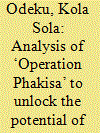

|
|
|
|
|
| Summary/Abstract |
South Africa is endowed with vast ocean resources and wealth which have the potential to provide enormous socio-economic goods and services to the people and create massive economic growth and wealth if vigorously explored and tapped. This assertion is made against the backdrop of the recent government strategical initiative, under the auspices of ‘Operation Phakisa’, to unlock and explore the full potential of the ocean’s wealth to drive economic growth, create jobs and alleviate poverty. This paper seeks to accentuate that the Operation Phakisa initiative has the potential to strategically unlock underexplored ocean resources for purposes of creating sustainable economic growth, development, and alleviation of hunger and poverty. It concludes that effective and sustainable use of the ocean’s wealth depends on good, efficient governance policies, practices and management. Methodically, a qualitative non-empirical research approach was adopted and utilized in this study by sourcing, drawing upon and using information and insights from contemporary literature to address identified problems.
|
|
|
|
|
|
|
|
|
|
|
|
|
|
|
|
| 2 |
ID:
088021


|
|
|
|
|
| Publication |
2009.
|
| Summary/Abstract |
Recently a number of objections have been raised against the use of ethanol produced from agricultural products such as maize, sugarcane, wheat or sugar beets as a replacement for gasoline, despite some of their advantages such as being cleaner and to some extent renewable. We address these objections in this paper. Topics discussed include the "corn connection" (which was theorized to be a cause of deforestation in the Amazonia), the rise of food prices due to ethanol production and the real possibilities of ethanol in reducing greenhouse gas emissions. It has been shown that such concerns are grossly exaggerated and that ethanol from sugarcane, as produced in Brazil, is the preferred option for the production of fuel not only in terms of cost but also as a favourable energy balance. Finally, the possibility of expanding ethanol production to other sugar-producing countries is also discussed.
|
|
|
|
|
|
|
|
|
|
|
|
|
|
|
|
| 3 |
ID:
166506
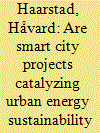

|
|
|
|
|
| Summary/Abstract |
The purpose of this paper is to investigate the links between smart cities and urban energy sustainability. Because achieving a “smart city” is a wide agenda rather than a specific set of interventions, smartness itself cannot easily be measured or quantifiably assessed. Instead, we understand smart cities to be a broad framework of strategies pursued by urban actors, and ask whether and how smart city projects catalyze urban energy sustainability. We use case studies of three cities (Nottingham, Stavanger, and Stockholm) funded by the Horizon 2020 Smart Cities and Communities program and examine how urban energy sustainability was advanced and realized through the smart city initiatives. We find first that while sustainability is not always a major objective of local implementation of smart city projects, the smartness agenda nevertheless increases the ambition to achieve energy sustainability targets. Second, the sustainability measures in smart cities are rarely driven by advanced technology, even though the smart city agenda is framed around such innovations. Third, there is significant sustainability potential in cross-sectoral integration, but there are unresolved challenges of accountability for and measurability of these gains.
|
|
|
|
|
|
|
|
|
|
|
|
|
|
|
|
| 4 |
ID:
091547
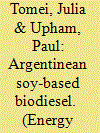

|
|
|
|
|
| Publication |
2009.
|
| Summary/Abstract |
This paper explores the economic, social and environmental context, drivers and impacts of increased demand for Argentine soy-based biodiesel. It is based on extensive stakeholder interviews in Argentina, including those in government, academia and the third sector; as well as participant observation with communities in soy cultivation areas; and review of relevant academic and grey literatures. Given Argentina's history of political instability and relatively weak levels of environmental protection, there is reason to be sceptical of the likely effectiveness of biofuel sustainability certification as applied to Argentine soy. Direct contracts between feedstock producers and biodiesel retailers may be a more reliable approach to minimise adverse environmental and social impacts than certification alone.
|
|
|
|
|
|
|
|
|
|
|
|
|
|
|
|
| 5 |
ID:
150380


|
|
|
|
|
| Summary/Abstract |
Implementing energy conservation initiatives within public schools, including both behavioral changes as well as building retrofits, can generate cost saving and educational benefits. However, the level of energy efficiency improvements that can be achieved may depend on the socio-economic characteristics of the school or the underlying district. The purpose of this research is to identify and examine the factors that have a role in influencing the adoption of energy-saving practices and/or building retrofits within Oklahoma’s public schools. In order to investigate these factors, a survey was administered to public school administrators across the state. The results illustrate different factors that drive schools to make decisions associated with energy conservation and retrofitting efforts. A comparative analysis between different types of schools (e.g., rural vs. urban, low- vs. high-income) was also conducted to discover the combination of characteristics that are associated with energy-saving measures. The findings could help school administrators and teachers understand how they might adopt new behaviors or technologies.
|
|
|
|
|
|
|
|
|
|
|
|
|
|
|
|
| 6 |
ID:
094940
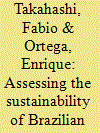

|
|
|
|
|
| Publication |
2010.
|
| Summary/Abstract |
The aim of this paper is to make an emergy assessment of oleaginous crops cultivated in Brazil, available to produce biodiesel, in order to determine which crop is the most sustainable. This study evaluates conventional agro-chemical farms that produce rapeseed (canola), oil palm, soybean, sunflower and cotton. Rapeseed (canola) crop uses 40.41% of renewable energy and it is the most sustainable conventional oil crop; on the other hand, it is not widely produced in Brazil, probably due to climate restrictions or low market demand. The oil palm emergy indicators are contradictory: its emergy exchange ratio (EER) value is the lower, showing the possibility of fair exchange, and the low transformity value indicates high efficiency; however, it also has low renewability (28.31%), indicating a high dependency on agro-chemicals (basically fertilizers). Oil palm is a potential energy source due to its high agricultural productivity, but appropriate management is necessary to increase its sustainability and reduce the use of non-renewable resources.
|
|
|
|
|
|
|
|
|
|
|
|
|
|
|
|
| 7 |
ID:
166429
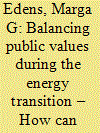

|
|
|
|
|
| Summary/Abstract |
Distribution of electricity constitutes an essential link in the energy sector value chain for which Distribution System Operators (DSOs) bear the responsibility. While executing that role, DSOs are expected to take into consideration public values, such as the availability, affordability and sustainability of the infrastructure they manage.
|
|
|
|
|
|
|
|
|
|
|
|
|
|
|
|
| 8 |
ID:
121371


|
|
|
|
|
| Publication |
2013.
|
| Summary/Abstract |
Biofuels policies and projects may lead to environmental, economic and social impacts. A number of studies point out the need to deliver comprehensive sustainability assessments regarding biofuels, with some presenting analytical frameworks that claim to be exhaustive. However, what is often found in the literature is an overexploitation of environmental and economic concerns, by contrast to a limited appraisal of the social aspects of biofuels. Building on a systematic review of the peer-reviewed literature, this paper discusses the social constraints and strengths of ethanol, with regard to the product's lifecycle stages and the actors involved. Its objective is to contribute to the development of social frameworks to be used in assessing the impact of ethanol. Main findings indicate that ethanol developments can increase the levels of social vulnerability, although there is little evidence in the literature regarding the positive and negative social impacts of 1st-generation ethanol and potential impacts of cellulosic ethanol. Further work is needed on the formulation of social criteria and indicators for a comprehensive sustainability assessment of this biofuel. Policy makers need to internalise the social dimension of ethanol in decision-making to prevent public opposition and irreversible social costs in the future.
|
|
|
|
|
|
|
|
|
|
|
|
|
|
|
|
| 9 |
ID:
185107
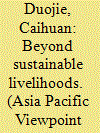

|
|
|
|
|
| Summary/Abstract |
This paper delves into rural peasants' livelihood-related agrarian changes revolving around their three major livelihood strategies in Qinghai. These strategies include peasant agriculture, seasonal migrant labour and caterpillar fungus harvesting, the latter two of which have been adopted since the mid-1990s. The research particularly focuses on rural Tibetan peasants' lived experiences in their efforts to achieve sustainable livelihoods through these three strategies in a specific village context. In doing so, the paper highlights resources, qualifications, opportunities, changes and challenges in rural peasants' livelihood realities. The empirical evidence from this paper suggests that rural Tibetan peasants' diverse ways of making livelihoods have a greater potential to imagine and build sustainable and equitable livelihoods. I argue that sustainable livelihoods approaches must be pursued in tandem with a diverse economies framework for analysing rural peasants' present way of making livelihoods. This new and critical way of studying rural peasant livelihoods can particularly highlight non-capitalist economic relations and practices that are the major contributors to sustainable and equitable livelihoods for Tibetan peasants.
|
|
|
|
|
|
|
|
|
|
|
|
|
|
|
|
| 10 |
ID:
166706
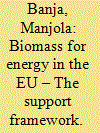

|
|
|
|
|
| Summary/Abstract |
This paper aims to produce a quantitative approach on the overall measures and on public support framework for biomass for energy, based on the EU countries reports under RED and existing literature. The way in which the support for biomass is implemented in the EU energy sector is not similar across EU countries. Feed-in tariffs and feed-in-premiums are still the dominant support schemes for the deployment of bioelectricity, whereas subsidies remain the main support for bioheat. Furthermore, a vast number of EU countries apply mandatory blending quotas for biofuels for transport. The paper shows that biomass for energy has a key role within the EU policy support for RES, in which targets are the main drivers, together with overarching biomass guidelines to anticipate any environmental constraints. Stable support showed the highest effectiveness in the past and remains the key factor for biomass deployment beyond 2020. The renewed targets need to be accompanied by long-term support measures and a commonly shared policy vision. A further harmonization of public bioenergy support towards a single EU cleaner energy market is recommended. This implies four policy actions for all EU countries: in-depth efficiency review, integration with RED-2, compatible sustainability guidelines and local impact assessments.
|
|
|
|
|
|
|
|
|
|
|
|
|
|
|
|
| 11 |
ID:
120028
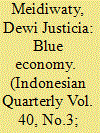

|
|
|
| 12 |
ID:
166970
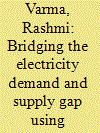

|
|
|
|
|
| Summary/Abstract |
Efficient and reliable electricity supply is critical for economic growth. India is facing multiple challenges of meeting country's electricity requirement, finding suitable resource transition from depleting fossil fuels and addressing the concern of climate change.
|
|
|
|
|
|
|
|
|
|
|
|
|
|
|
|
| 13 |
ID:
087969
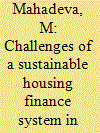

|
|
|
| 14 |
ID:
184105
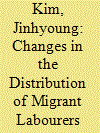

|
|
|
|
|
| Summary/Abstract |
This study applies the comprehensive wealth framework (CWF) to more fully assess the regional impacts of changes in the distribution of migrant workers in the recent urbanisation of China. The analysis indicates that changes in the distribution of migrant labourers have contributed to sustaining or increasing GDP growth rates and the level of human capital in both central and western regions. However, there is evidence that social and political capital may have declined along with the inflow of the mobile labour force and some lowered local government investments. From the perspective of the CWF, this study concludes that the impacts of distributional changes on regional comprehensive wealth is uncertain, potentially reducing the comprehensive wealth of the region.
|
|
|
|
|
|
|
|
|
|
|
|
|
|
|
|
| 15 |
ID:
167104


|
|
|
|
|
| Summary/Abstract |
In Africa, rural communities thrive on social capital and tend to have a number of commonalities that force them to share natural, physical and social resources. It has been a trend in sub-Saharan Africa to have either formal or informal collaborative management agreements to manage common pool resources (CPRs) to accommodate different actors and interests. This paper draws lessons from past and contemporary collaborative schemes in Cameroon and South Africa to enhance the practice and governance processes of natural resources in sub-Saharan Africa in order to promote sustainable development. Using research methods inspired by the tradition of participatory research to collect field-based data and complemented by reflections on previous and existing studies, the paper highlights the importance and benefits of participatory democracy as opposed to representational democracy in co-management of natural resources in rural spaces. It further discusses the need to redefine the roles of national and local governments, the youths and women in ensuring effective participation and the essence of unifying the judicial and culture. To guarantee sustainability of collaborative community-based natural resources, the paper emphasises the role and importance of youth and women empowerment. These issues have been discussed within the broader sustainability discourse.
|
|
|
|
|
|
|
|
|
|
|
|
|
|
|
|
| 16 |
ID:
115647
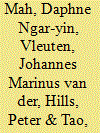

|
|
|
|
|
| Publication |
2012.
|
| Summary/Abstract |
Consumers have a major role to play in smart grid technologies which can be instrumental in addressing climate change and energy challenges. However, little is known about how consumers perceive, and how they might respond to the opportunities that smart grid technologies offer. This paper reports the results from a Hong Kong survey (n=505). It contributes to the literature by providing a better understanding of the perceptions and behaviour of electricity consumers about the possible deployment of smart grids.
Our results indicate that Hong Kong consumers generally welcomed smart grid technologies and had a preference for energy saving, energy efficiency and renewable energy while they showed a high level of opposition to nuclear power. They displayed an interest in playing a much more informed and active role in energy decision-making, but they were sensitive to tariff increases. Motivations and barriers for consumers to support smart grid developments are also discussed. We conclude with a discussion of policy implications for effective consumer engagement. More policy attention is needed on demand-side measures, introducing institutional and regulatory changes, and modifying relationships between consumers, the government and utilities.
|
|
|
|
|
|
|
|
|
|
|
|
|
|
|
|
| 17 |
ID:
170228
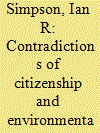

|
|
|
|
|
| Summary/Abstract |
This article scrutinizes the limitations of environmental citizenship among citizens and non-citizens in the Arab Gulf states, with a focus on the United Arab Emirates (UAE). There are particularly heightened concerns about water scarcity, food security, marine pollution, and dependence on oil and gas industries and how states can address these challenges in the Gulf Cooperation Council (GCC). Yet environmental citizenship in the Indian Ocean’s Arabian littoral remains poorly understood both in terms of theoretical and grounded questions. This article considers how labor relations and discourses relating to citizenship, environment and sustainability enable or foreclose environmental reform in GCC countries. It shifts the technological and economic focus predominant in literature on sustainability in the GCC to take a more social perspective and examine distinctions between citizens and non-citizens and the depoliticising of environmental claims and national industrial legacies.
|
|
|
|
|
|
|
|
|
|
|
|
|
|
|
|
| 18 |
ID:
173820
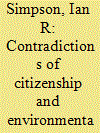

|
|
|
|
|
| Summary/Abstract |
This article scrutinizes the limitations of environmental citizenship among citizens and non-citizens in the Arab Gulf states, with a focus on the United Arab Emirates (UAE). There are particularly heightened concerns about water scarcity, food security, marine pollution, and dependence on oil and gas industries and how states can address these challenges in the Gulf Cooperation Council (GCC). Yet environmental citizenship in the Indian Ocean’s Arabian littoral remains poorly understood both in terms of theoretical and grounded questions. This article considers how labor relations and discourses relating to citizenship, environment and sustainability enable or foreclose environmental reform in GCC countries. It shifts the technological and economic focus predominant in literature on sustainability in the GCC to take a more social perspective and examine distinctions between citizens and non-citizens and the depoliticising of environmental claims and national industrial legacies.
|
|
|
|
|
|
|
|
|
|
|
|
|
|
|
|
| 19 |
ID:
139967


|
|
|
|
|
| Summary/Abstract |
In the centenary year of the dardanelles operation, the author uses the principles of war to analyse some of the reasons for the failure of the campaign.
|
|
|
|
|
|
|
|
|
|
|
|
|
|
|
|
| 20 |
ID:
103391
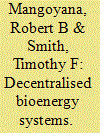

|
|
|
|
|
| Publication |
2011.
|
| Summary/Abstract |
Decentralised bioenergy systems are receiving increasing attention due to the potential ability to support local development, create local employment, and contribute to climate change mitigation. These issues, along with other bioenergy sustainability issues, are reviewed through eighteen international case studies with the objective of identifying opportunities and threats to decentralised bioenergy systems. The case studies were selected based on feedstock type, bioenergy type, production capacity, synergistic alliances, ownership structure and physical locations. This variation was used to provide a basis for evaluating opportunities and threats from different contexts. Commercial viability remains the primary concern for the sustainability of decentralised bioenergy systems. There are, however, opportunities for compounding benefits through integrating small scale decentralised bioenergy systems with other production systems. Integrated production, including closed loop models, allow waste materials from one process to be used as inputs in other production processes, and thereby increasing economic, social and environmental outcomes. Synergistic opportunities along the bioenergy production chain, which include feedstock production, bioenergy marketing and distribution could also be exploited by communities and other investors to minimise decentralised production risk.
|
|
|
|
|
|
|
|
|
|
|
|
|
|
|
|
|
|
|
|
|